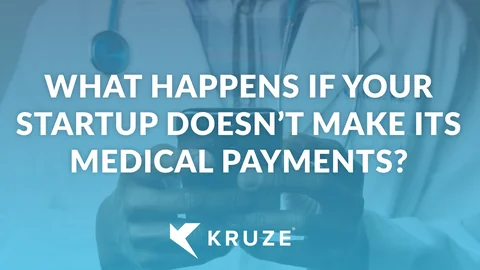
Although this topic only comes up every couple of years in the Kruze client base, it is a huge deal. What happens if your startup doesn’t make its medical payments (as in the monthly insurance premiums that are required to keep the employees’ health plans active)? Not making medical payments can be confusing for founders, especially if it is the first company they’ve run. Often, founders think that the payroll provider will make the payments for them.
To avoid any confusion, we address this quite a bit during the onboarding process with our clients. We advise that it is essential that a direct ACH debit is set up with their medical benefits provider like Blue Cross Blue Shield, Kaiser, whoever you’re using.
But sometimes, founders don’t do it - so what happens?
Your Startup Didn’t Make Its Medical Payments:
- Failing to make medical benefit payments is a massive deal for a startup.
- Payroll Providers are not responsible for payments to insurance companies. You must set up a direct ACH debit with your medical provider
- Founders are putting the employee at risk that their bills will not be subsidized by medical insurance.
- You’re also putting the company’s integrity and employees’ confidence in the company at risk.
- The employee could easily sue officers of the company both at the corporate level and personally.
- It’s potentially illegal for a company to claim it pays benefits and does not.
- Miss a payment?
- If it’s only been a month - call your benefits provider ASAP. They can reinstate you
- If it’s been a few months - utilize an HR professional to help you navigate getting reinstated
Let’s talk about the downside of a startup not making its medical payments.
This is important because one of the core things you need as a successful company is for the employee base to have confidence in the company. If the employees find out that they’re not covered because the company didn’t make the medical benefits payment, maybe they’re in the emergency room or something like that, that can rock the company culture. It’s toxic.
Additionally, you, as a company, could potentially be liable for all the medical bills. Even worse, the company officers, executives, and directors can be personally responsible. Not providing healthcare insurance when you’ve said that you do is a big deal.
There is a high likelihood of a lawsuit if the company does not make the payments on behalf of the employees.
It is critically important that you take care of this. As a founder, there are a million things you have to take care of, but setting up that automatic debit ACH to the medical benefit insurance companies is a must.
Now, if you find out you haven’t been doing it, especially if it’s been a month or two, it is a relatively easy fix. Call the benefits provider and get on the phone with them. They will usually reinstate you pretty quickly.
However, if it’s been three, four, or six months, this is a real issue. You may have to re-enroll. In this case, I highly recommend having an HR professional who’s up-to-date and has friendly relationships to call upon at the insurance companies.
If you are a Kruze client and this happens to you and you need help, contact us. We’re happy to connect you to folks who can get it fixed and make sure your employees are covered.
In closing, note that the payroll providers are not on the hook for this. They do not make those payments for you. Your company needs to do it. And if it goes wrong, act quickly, fix it because the executive team and the company can be held liable. So be careful and hope this helps.















